Does Confucius’ goal of a peaceful and prosperous society built upon learning, virtue, and the Way go beyond reasonable expectation? The question is worthy of discussion.
The Master said, To be silent and understand, to learn without tiring, never to weary of teaching others—this much I can do. (p.48, 7.2)
 Reading The Analects of Confucius (all references are to the Burton Watson translation, Columbia, 2007), I am moved by Confucius’ inspirational message regarding learning, studying, and teaching. I have great admiration for this sage who praises learning without tiring and teaching without wearying. The value of learning for its own sake is expressed in the opening words of the book, “The Master said, Studying, and from time to time going over what you’ve learned—that’s enjoyable, isn’t it?” (p. 16, 1.1). It appears that Confucius is dedicated to learning and teaching both as pleasures in themselves and for civic improvement. But, what is the hoped for utilitarian outcome of Confucian teaching? “The Master said, Conduct government in accordance with virtue, and it will be like the North Star standing in its place, with all the other stars paying court to it” (p. 20, 2.1). Is government conducted in accordance with virtue the essential outcome desired of a Confucian dedication to learning and teaching? If so, then what does Confucius have to be worried about? “The Master said, Virtue not sufficiently practiced, learning not sufficiently digested, to hear what is right and not be able to do it, to have shortcomings and not be able to remedy them—these are the things that I worry about” (p. 48, 7.3).
Reading The Analects of Confucius (all references are to the Burton Watson translation, Columbia, 2007), I am moved by Confucius’ inspirational message regarding learning, studying, and teaching. I have great admiration for this sage who praises learning without tiring and teaching without wearying. The value of learning for its own sake is expressed in the opening words of the book, “The Master said, Studying, and from time to time going over what you’ve learned—that’s enjoyable, isn’t it?” (p. 16, 1.1). It appears that Confucius is dedicated to learning and teaching both as pleasures in themselves and for civic improvement. But, what is the hoped for utilitarian outcome of Confucian teaching? “The Master said, Conduct government in accordance with virtue, and it will be like the North Star standing in its place, with all the other stars paying court to it” (p. 20, 2.1). Is government conducted in accordance with virtue the essential outcome desired of a Confucian dedication to learning and teaching? If so, then what does Confucius have to be worried about? “The Master said, Virtue not sufficiently practiced, learning not sufficiently digested, to hear what is right and not be able to do it, to have shortcomings and not be able to remedy them—these are the things that I worry about” (p. 48, 7.3).
If today we share the Master’s worry, concern about virtue insufficiently practiced and learning insufficiently digested, then we would be admitting that we share similar goals and similar worries as this sage of 2,500 years ago. Perhaps our hopes for the transformative power of education align with those of Confucius, as do our worries. When Confucius’ disciple Zilu told an inquiring gatekeeper he was coming from Confucius’s house the gatekeeper responded to Zilu by asking: “The one who knows there’s nothing that can be done but keeps on trying?” (p. 102, 14.40). Is this a proper epitaph for Confucius? After all, is it a sage-like quality to keep up trying when there’s nothing to be done? Does Confucius put too much trust in the power of knowledge to make individuals, families, and government, virtuous? It seems that Confucius understands that there are few guarantees involved in teaching. He does tell us early on that if a gentleman “studies he will avoid narrow-mindedness” (p. 17, 1.8). This is added to when the Master says: “The gentleman is fair-minded and not partisan. The petty man is partisan and not fair-minded” (p. 21, 2.14). To have gentlemen (civic leaders) who are fair-minded and non-partisan, who avoid narrow-mindedness, is a good beginning. Perhaps it is even essential enough that it alone justifies Confucius’ commitment to learning and teaching. Certainly, if one hopes to have students, and eventually the entire nation, grow in virtue so that civil society may flourish then following the Master’s advice to study the Book of Odes is apt as it “may be summed up in a single phrase: Think nothing base” (p. 20, 2.2). To think nothing base should be a solid foundation for virtuous behavior.
How does the above apply to the power of government to form a virtuous people? Is the government involved in educating for virtue?
The Master said, Guide them with government orders, regulate them with penalties, and the people will seek to evade the law and be without shame. Guide them with virtue, regulate them with ritual, and they will have a sense of shame and become upright. (p. 20, 2.3)
This passage offers a penetrating commentary on Confucius’ view of the importance of government policy in shaping a people who will be “upright” citizens. Rather than motivating the people primarily through the disincentive of punishment Confucius recommends the formative value of virtuous guidance, orderly ritual, and a clear distinction between right and wrong bringing with it the inhibiting power of a well-formed conscience. This is consistent with Confucius’ approach to learning, studying, and teaching. To discipline oneself to learn well is to commit to choosing the path of thoughtful examination of the matter at hand, considering facts, experience, and sage counsel. Is everyone capable of this? Confucius is clearly aware that human beings come equipped with different capabilities and this must be considered when applying the Confucian school of thought. As the Master said: “Those born with understanding rank highest. Those who study and gain understanding come next. Those who face difficulties and yet study—they are next. Those who face difficulties but never study—they are the lowest type of people” (p. 117, 16.9). While this statement does acknowledge differences in the capabilities among people it also allows for the possibility that many difficulties may be addressed, even by the “lowest type of people,” when they choose study and learning. The Master made clear that all should: “Study as though you could never catch up, [and if you did,] you would still be fearful of losing it” (p. 56, 8.17).
Is Confucius overestimating the willingness of people to dedicate themselves to learning and acquiring virtue? Certainly, he is expounding very high standards that, as he is aware, will not be met by all. If high standards of learning, including the knowledge of the rituals, is incorporated into the life of gentlemen (civic leaders), and government officials, it will make it much more likely that Confucius’ vision of a peaceful, ordered, and prosperous society will be achievable. But, as in seminar, shared inquiry does not always lead to agreement on which path to follow. Confucius says: “You may study alongside a person but can’t agree with him how to pursue the Way. You may pursue the Way with him but can’t agree where to take your stand. You may agree where to take your stand but not how to adapt to circumstances” (p. 64, 9.31). If a commitment to learning and virtue does not automatically bring the students to complete agreement on the challenges facing society and the possible solutions, then is there a significant value which will always be obtained? If the statement above is true, then yes. For shared inquiry and thoughtful pursuit of truth should build bonds of solidarity and allow for disagreements to be settled without unnecessary misunderstandings and rancor. Perhaps this is excessively idealistic. However, what is the alternative?
It is best that those who seek understanding endeavor to work with each other to find creative solutions to the problems the community faces. It will not always produce the desired results, but Confucius places his hope in leading those who are capable, and willing, to higher planes of cooperation. For those who are unwilling then “If they’re not eager to learn, I don’t enlighten them” (p. 48, 7.8). This would seem to be a practical solution to the challenge of trying to teach those whose resist learning. Certainly, this is where the Master’s advice is greatly needed when he says “Don’t worry about others’ not understanding you. Worry about your own lack of ability” (p. 101, 14.32). Confucius does not assume that all will choose the right Way or that understanding, and cooperation, will be easy. He does seem to offer that there is no better alternative to advancing the individual, families, communities, and the nation, to a more peaceful state of existence than through the path of learning, study, and teaching.
What does Confucius show us is the result of his personal commitment to this Way of life? Significantly, he makes very clear that this path is neither easy nor short.
At fifteen I set my mind on learning; by thirty I had found my footing; at forty I was free of perplexities; by fifty I understood the will of Heaven; by sixty I learned to give ear to others; by seventy I could follow my heart’s desires without overstepping the line. (p. 20, 2.4)
This path, Confucius’ Way, is a lifetime project. It shapes Confucius’ life and his standards for his disciples. Confucius is committed to an educational project which has shaped his life and will play a role in shaping generations of Chinese for the next 2,500 years. And still, he admits, that he was seventy before he could live within the boundaries of his Way without “overstepping the line.” This is both promising, in that he shows us the possibilities of the Way, while also daunting in that it took Confucius a lifetime to reach this level of achievement.
Is there a clear path to follow Confucius? He tells us to “Be thoroughly versed in the old, and understand the new—then you can be a teacher” (p. 21, 2.11). I’m not sure this is specific enough, but it does give the student clues on how to follow the Master. We should study the old (the Classics) and not ignore what is worthy of consideration among the new methods. Confucius also reminds us that “The gentleman has his mind fixed on virtue; the petty man has his mind fixed on land” (p. 33, 4.11). We should keep our eyes on the greater goal (virtue) and not be blinded by a fixation on wealth (land). This is a constant danger for the seeker of truth and virtue as the temptations of the world continually present themselves to us in beguiling disguises.
When will we know that we are on the path to learning and virtue? As Confucius tells his disciple Zilu: “Shall I teach you what it means to know something? When you know, to know you know. When you don’t know, to know you don’t know. That’s what knowing is” (p. 22, 2.17).
This is a perplexing statement that leaves one with more questions and wondering what it is to “know.” Additionally, Confucius admitted that even he had not completed his journey to the Way when he acknowledged that “The Way of the gentleman has three characteristics that are still beyond me. The humane are never anxious; the wise, never perplexed; the brave, never afraid” (p. 101, 14.30). If these characteristics of a gentleman are beyond Confucius, then I look on this path with trepidation as I am far behind him.
Is Confucius’s vision idealistic? Does his goal of a peaceful and prosperous society built upon learning, virtue, and the Way go beyond reasonable expectation? The question is worthy of discussion. It is worthwhile to remember Confucius gives what may be his ultimate answer: “I study affairs close at hand and try to become adept in higher matters. Perhaps it is Heaven that understands me!” (p. 102, 14.37).
The Imaginative Conservative applies the principle of appreciation to the discussion of culture and politics—we approach dialogue with magnanimity rather than with mere civility. Will you help us remain a refreshing oasis in the increasingly contentious arena of modern discourse? Please consider donating now.
The featured image, uploaded by Boubloub, is detail of the ceiling of the Salle des Conferences du Conseil d’Etat (Louvre), showing Moses and Confucius among famous past legislators.This file is licensed under the Creative Commons Attribution-Share Alike 4.0 International license, courtesy of Wikimedia Commons.


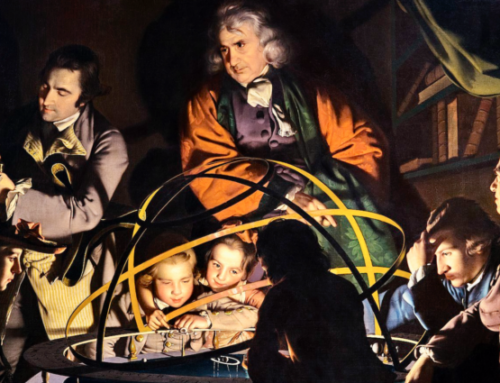
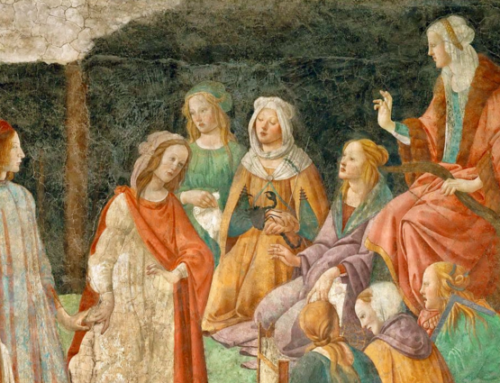
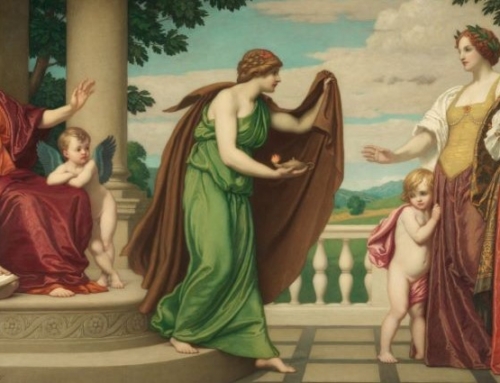
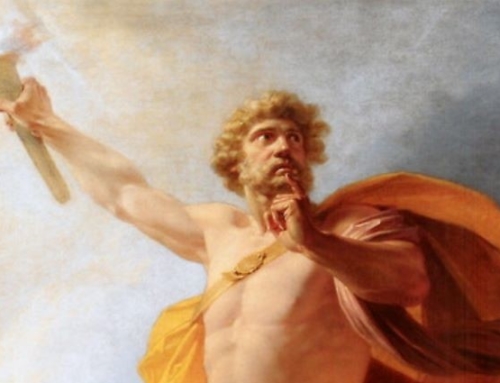
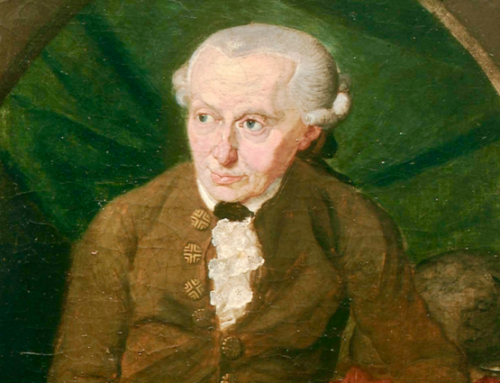
Leave A Comment